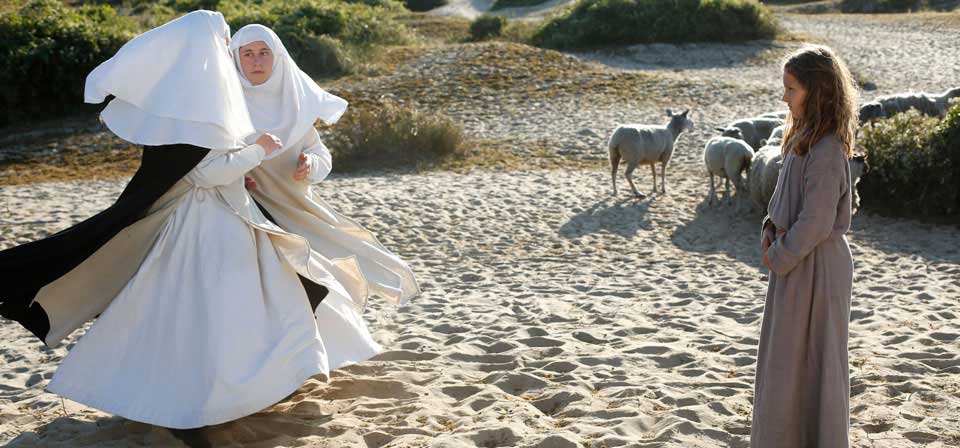Perceval (1978)
The spirit of medieval drama lives in Perceval, Eric Rohmer’s utterly unique, flagrantly theatrical adaptation of Chrétien de Troyes’ 12th-century epic Arthurian poem, a film that will enchant medieval enthusiasts and bewilder others.
Caveat Spectator
Some mildly suggestive and sensual content including a forcibly obtained kiss and a rather innocent bedroom scene. Subtitles.The narration in verse has been set to music adapted from authentic medieval melodies, and is sung in the original old French by a chorus of minstrels playing traditional instruments, as well as by the players themselves. The players’ bright costumes and the overtly stagey sets — a grove of abstract sculpture-like trees for a forest; simple façade castles built of painted wood — were inspired by medieval paintings and illuminated manuscripts.
The result is something that might strike casual viewers as not wholly unlike a serious dramatic Monty Python production — a far from exact analogy that may nevertheless give readers a rough idea of how likely they are to appreciate the film.
Following Chrétien’s unfinished romance, Perceval is incomplete — in fact, it is three incomplete stories. The first is the naive, fable-like tale of Perceval, the bumpkin knight whose sheltered innocence is rewarded, despite lapses and ignorant errors, with a vision of the Grail (not yet clearly identified in Arthurian tradition with the cup of the Last Supper). Perceval’s story is abruptly interrupted by an adventure of Gawaine, and finally a moment of spiritual insight leads to a startling Passion-play finale.
Though a French Arthurian art film of the same era as Robert Bresson’s Lancelot of the Lake, Perceval provides the greatest possible contrast to Bresson’s film. Where Lancelot is grim and meditative, Perceval is bouyant and dreamlike. Lancelot, like its hero, is haunted by human weakness and the hopeless impossibility of the Arthurian ideal, while Perceval is about one of the two knights (along with Galahad) whose otherworldly aspirations reached beyond chivalry and honor.
Together, the two films represent the yin and yang of Arthuriana, and remain the most intriguing cinematic excursions into Arthurian Logres.
Related

Jeannette: The Childhood of Joan of Arc (2018)
Jeannette is a dialogue, and a mutual cross-examination, not only among the main characters of the drama, and above all between man and God, but also between the poet Péguy and the filmmaker Dumont, and even between Péguy the Socialist unbeliever of 1897 and Péguy the believing Catholic of 1910.
Recent
- Benoit Blanc goes to church: Mysteries and faith in Wake Up Dead Man
- Are there too many Jesus movies?
- Antidote to the digital revolution: Carlo Acutis: Roadmap to Reality
- “Not I, But God”: Interview with Carlo Acutis: Roadmap to Reality director Tim Moriarty
- Gunn’s Superman is silly and sincere, and that’s good. It could be smarter.
Home Video
Copyright © 2000– Steven D. Greydanus. All rights reserved.